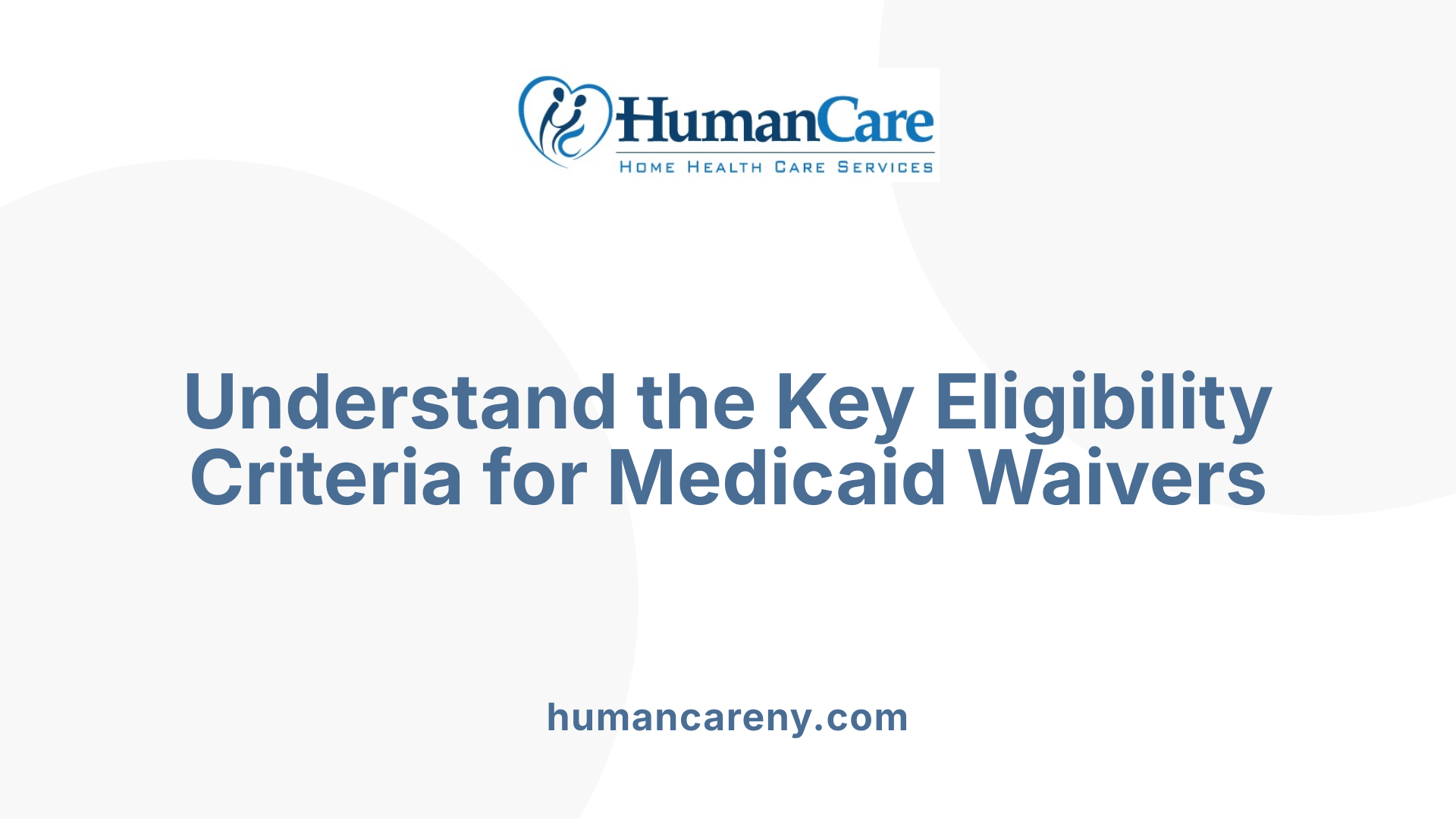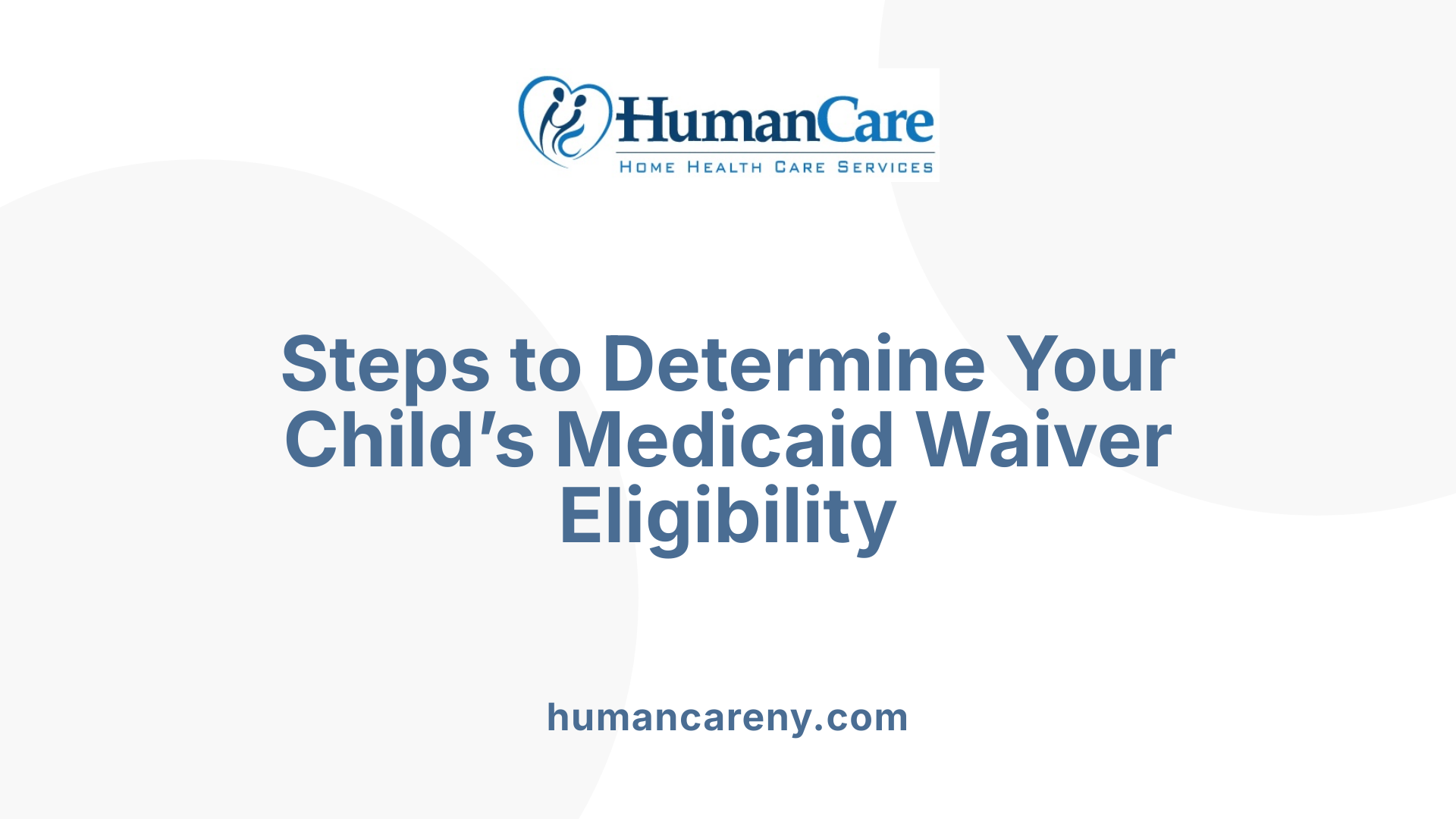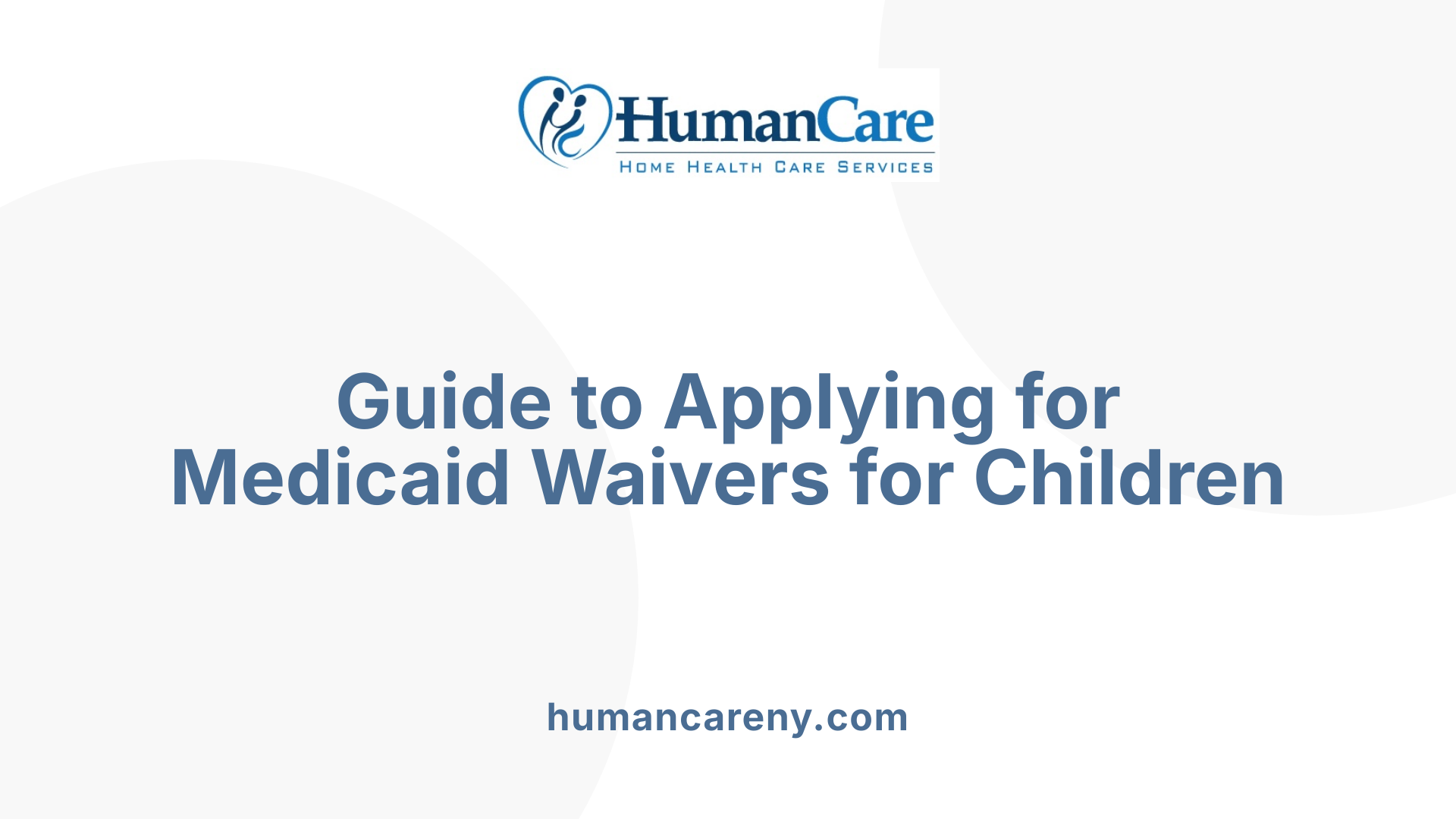Understanding Eligibility and Access to Essential Services
Medicaid waivers serve as a vital resource for children with developmental delays, providing access to a broad range of home and community-based services. These programs help families maintain children in their home environments and promote skill development, independence, and overall well-being. This comprehensive guide explores the eligibility criteria, application processes, available services, and resources to help families navigate the complex landscape of Medicaid waivers tailored for children with developmental delays.
Eligibility Criteria for Medicaid Waivers for Children with Developmental Delays

What are the eligibility criteria for Medicaid waivers for children with developmental delays?
Accessing Medicaid waivers for children with developmental delays requires meeting specific eligibility standards that evaluate the child's medical condition, level of need, and family circumstances.
First, children must have a documented diagnosis of a developmental disability or related condition such as Autism, Cerebral Palsy, or other significant developmental challenges. This diagnosis should be established by qualified medical or mental health professionals and typically needs to have been present before the age of 18.
In addition to the diagnosis, children must demonstrate substantial limitations in at least three major areas of functioning. These areas include self-care, learning, mobility, self-direction, expressive and receptive language, and behavior control. For instance, a child who struggles with daily activities, has difficulty in educational settings, or requires assistance with movement might qualify under these criteria.
Assessment and evaluation play a crucial role in determining eligibility. Many programs, such as Michigan's Children's Waiver Program, require an assessment conducted by the Community Mental Health Services Program or equivalent agencies in other states. The evaluation also involves a Functional Needs Assessment to confirm the child's level of care needs, often comparing to the level of support provided in an institutional setting.
Family income and resources are also considered, although some waivers, like TEFRA or the HCBS programs, disregard parental income. For example, TEFRA allows eligibility based on the child's income alone, excluding parental earnings, recognizing that many children with disabilities require long-term support regardless of family income.
Finally, children need to be placed on a developmental services registry or waitlist from which they are selected based on the severity of their needs. They must also require a level of care that aligns with criteria such as ICF/IID or ICF/ID levels of assistance. These criteria ensure that services are directed towards children with the most significant needs, enabling them to live and thrive in community settings instead of institutional environments.
Overall, these criteria aim to tailor support to children with the most substantial developmental challenges, ensuring they receive appropriate community-based assistance to develop skills and prevent loss of abilities.
Determining If a Child Qualifies for Medicaid Waivers

How can I determine if a child with developmental delays qualifies for Medicaid waivers?
Determining eligibility for Medicaid waivers for children with developmental delays depends on several factors, including age, diagnosis, functional needs, and financial criteria.
First, the child's age is important. Most programs target children under 18, with some extending to young adults up to age 20 or 22, depending on the specific waiver.
The child's developmental status must be documented through medical evaluations showing a diagnosable developmental disability or significant delay recognized under state law.
Eligibility typically requires meeting either functional or medical criteria indicating the need for intensive supports, similar to those required for institutional care. For example, children may need to demonstrate behaviors or medical conditions that require continuous human intervention – such as assistance every two hours during the day or every three hours at night.
Documentation from healthcare providers, psychological assessments, and functional needs evaluations play a crucial role in establishing eligibility. Medical records and detailed assessments help confirm a child's need for services that develop or maintain current abilities or prevent regression.
Financial considerations vary across programs. For some waivers, like California's HCBS-DD Waiver, only the child's income is considered. This is called "institutional deeming," meaning family income is disregarded, which can make qualifying easier for families with higher incomes.
Additionally, certain programs, such as TEFRA or Katie Beckett, offer Medicaid coverage regardless of parental income if the child meets specific disability criteria. These programs assess the child's disability according to SSA standards, and eligibility does not depend on family financial status.
Overall, families should contact local agencies or regional centers, submit necessary documentation, and undergo assessments to determine their child's eligibility. Each state may have slight variations, so consulting local Medicaid offices or developmental disability programs is recommended.
Services and Benefits Available Through Medicaid Waivers
 Medicaid waivers play a crucial role in providing tailored services for children with developmental delays to support their wellbeing and community integration. These programs cover a wide spectrum of support including habilitation services, various therapies, and in-home assistance. Habilitation services help children develop daily living skills, while therapies like speech, occupational, and behavioral support target specific developmental needs.
Medicaid waivers play a crucial role in providing tailored services for children with developmental delays to support their wellbeing and community integration. These programs cover a wide spectrum of support including habilitation services, various therapies, and in-home assistance. Habilitation services help children develop daily living skills, while therapies like speech, occupational, and behavioral support target specific developmental needs.
Different waiver programs offer distinct services based on individual assessments. For instance, children in the Children's Waiver Program or California’s HCBS-DD Waiver may access behavioral interventions, community living arrangements, respite care, and assistive technology. Texas’s waivers include personal care, medical equipment, and employment supports.
Supports are focused on enhancing skills for everyday activities, fostering independence, and preventing skill loss. Many programs also provide home modifications and transportation to maintain active participation in their communities. The goal of these waivers is to help children live as independently as possible, often staying in familiar environments with family and community supports.
Services offered can vary significantly depending on the child's assessed needs and the specific waiver. For example, some waivers emphasize medical and behavioral support, while others prioritize skill development, employment readiness, or daily living assistance. Eligibility and available services are carefully tailored, ensuring children receive the most appropriate supports to improve their quality of life.
| Waiver Program | Main Services Offered | Focus Areas | Additional Notes |
|---|---|---|---|
| Children’s Waiver (Michigan) | Home-based services, behavioral supports | Skills development, preventing skill loss | Supports about 669 children yearly |
| Texas HCS, CLASS | Personal care, respite, therapies | Independence and daily living | Extensive list of specialized waivers |
| HCBS-DD (California) | Behavioral, community, and residential services | Community living, employment | No waiting list, broad access |
| Missouri MOCDD | Medicaid services, family waiver | Family-centered support | Considers parental income waived |
| Louisiana Children’s Choice | Support and therapeutic services | Childhood developmental needs | Aims to transition children to adult services |
Medicaid waivers are designed not only to provide health coverage but to also promote autonomy by offering services customized to each child's needs. They serve as vital tools in enabling children with disabilities to thrive within their communities, offering a supportive bridge from intensive care to independent living.
Application Process for Medicaid Waivers

What is the application process for Medicaid waivers for children with developmental delays?
Applying for Medicaid waivers for children with developmental delays varies slightly from state to state, but generally involves several common steps. In California, parents or guardians first need to apply for Medi-Cal, the state’s Medicaid program, which provides health coverage for eligible individuals. Once approved for Medi-Cal, families should contact their local Regional Center—an agency responsible for providing services to individuals with developmental disabilities.
The Regional Center guides families through the process of applying for specific waivers, such as the HCBS-DD Waiver, which offers a range of services including behavioral therapy, community living supports, and employment assistance. To qualify, families usually need to submit medical and developmental documentation demonstrating the child's need for these services and their level of care.
Throughout the process, assessments are conducted to determine the child's eligibility based on their diagnosis, functional needs, and level of support required. In many cases, there is no waiting list for this specific waiver, making it accessible once all documentation and criteria are met.
Ongoing eligibility is reviewed periodically, and renewal involves providing updated assessments and documentation to continue receiving services. These steps help ensure that children receive tailored support in their communities while meeting federal and state Medicaid requirements.
How do regional centers assist in the application process?
Regional Centers play an essential role in the application process. They serve as the primary contact for families seeking services and help complete necessary paperwork. They also coordinate assessments to verify the child's level of care, ensuring compliance with Medicaid standards.
Documentation and assessments needed
Families are required to submit medical records, diagnosis, and functional assessments showing the child's developmental disability and support needs. These documents are crucial to determine eligibility, particularly the child's need for in-home and community-based services.
Waiting list considerations and timelines
In California, the HCBS-DD Waiver has no current waiting list, allowing immediate application follow-up once eligibility is established. Elsewhere, some states may have wait times, sometimes several years, depending on available resources and demand.
Steps for renewal and ongoing eligibility
Renewals typically involve updating assessments, verifying consistent support needs, and reviewing income and other eligibility factors. Families should prepare documentation ahead of renewal dates to maintain access to services without interruption.
Eligibility for Medicaid Home and Community-Based Services (HCBS) Waivers
What are the general requirements to be eligible for Medicaid Home and Community-Based Services (HCBS) waivers for children with developmental delays?
To qualify for HCBS waivers targeting children with developmental delays, applicants generally need to meet several criteria. These requirements ensure that the services reach children who genuinely need support to live at home and avoid institutional care.
First, age is a significant factor. Most programs serve children up to 20 years old. Residency also matters; children must live in the state providing the waiver and in settings that comply with community living standards.
Secondly, medical and developmental conditions are necessary. Children should have a diagnosed condition such as a developmental disability, autism, or another qualifying medical condition that significantly impairs daily functioning. For some programs, notably the HCBS-DD Waiver in California, eligibility includes being classified as medically fragile or having degenerative diseases like spinocerebellar ataxia.
Level of care requirements are critical. Children must demonstrate the need for a high level of assistance, typically meeting the criteria for an Intermediate Care Facility for Individuals with Intellectual Disabilities (ICF/IID). This involves needing 24-hour supervision or assistance, verified through assessments of medical and behavioral needs.
Financial considerations also play an essential role. Income and resources are evaluated according to state and federal guidelines. For many programs, parental income is disregarded for children under 18, allowing eligibility based solely on the child’s income and assets.
Lastly, safety and the child's living situation are examined. The child should be able to reside safely at home with appropriate supportive services. The waiver’s goal is to support stable home living, either delaying or preventing the need for institutional placement.
These comprehensive criteria aim to identify children who benefit most from community-based services while ensuring the limited resources are allocated effectively. Meeting these standards typically involves evaluations by medical professionals, social workers, and state agency assessments.
Resources and Contact Information for Medicaid Waiver Programs
 Finding the right support services for children with developmental delays starts with knowing where to look for resources and whom to contact. Each state has its own Medicaid agency responsible for overseeing waiver programs, and many provide detailed information online, including descriptions of available waivers, eligibility requirements, and application procedures.
Finding the right support services for children with developmental delays starts with knowing where to look for resources and whom to contact. Each state has its own Medicaid agency responsible for overseeing waiver programs, and many provide detailed information online, including descriptions of available waivers, eligibility requirements, and application procedures.
For example, the Washington State Developmental Disabilities Administration (DDA) serves as a primary resource. Families and caregivers can access program details, legal standards, and contact information through the DDA’s local offices or regional offices. Families can also reach out via email at leila.graves@dshs.wa.gov, requesting specific information or assistance.
Many states maintain online portals where families can submit inquiries through forms like the 'Services and Information Request' to connect with case managers or intake specialists directly. These portals often include options to review the list of participating providers, access application forms, and track application status.
Community organizations and advocacy groups are also invaluable resources. They often offer guidance, support with application processes, and information about additional services available in the community.
For program-specific questions or to start an application, families should visit their state Medicaid website or contact regional offices directly. These sources provide current contact points, office hours, and links to online application portals.
To summarize, reliable ways to find resources include:
| Resource Type | Description | Contact Methods |
|---|---|---|
| State Medicaid Agency | Official government portal with program details | Website, email, phone |
| Regional Offices | Local support and direct assistance | Phone, in-person visits |
| Advocacy Organizations | Guidance and advocacy support | Local offices, online forums |
| Program-Specific Portals | Online application and inquiry forms | Web forms, email |
By utilizing these resources, families can more easily navigate the complexities of Medicaid waiver programs and access the services their children need to thrive in community settings.
Navigating Support for Your Child's Future
Understanding the eligibility and application process for Medicaid waivers is crucial for families seeking essential services for children with developmental delays. While the system may seem complex, resources are available to guide you through eligibility assessments, application procedures, and available services. Being proactive and informed ensures your child receives the supports they need to thrive at home and in the community. Reach out to your state Medicaid office, regional centers, and local advocacy groups to explore options tailored to your child's needs and to secure the support that can make a meaningful difference in their life.
References
- Children's Waiver Program - State of Michigan
- Missouri Children with Developmental Disabilities Waiver - myDSS
- Medicaid Waivers for Child Services - SOAR Works! - SAMHSA
- Children's Extensive Support Waiver (CES) - HCPF
- Texas Medicaid Waiver Programs for Children with Disabilities
- Florida - Kids' Waivers
- Indiana Medicaid: Members: Family Supports Waiver - IN.gov



